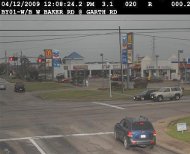Article from: www.thenewspaper.com/news/32/3236.asp
8/20/2010
Red Light Cameras Increase Accidents in Baytown, Texas
Accidents increased 40 percent one year after red light cameras went live in Baytown, Texas.
 After a year of use, red light cameras have failed to deliver the promised safety benefits in Baytown, Texas. The Houston suburb activated the majority of its cameras on July 13, 2008. Since then, the number of accidents at eight camera locations has increased 40 percent, contrary to predictions from city officials. The increase in accidents has not been in minor "fender benders," as is frequently claimed by photo ticketing advocates. Rather, the number of collisions resulting in an injury jumped 75 percent. Rear end collisions increased 39 percent. Results from comprehensive, independent studies elsewhere in the country have yielded similar results.
After a year of use, red light cameras have failed to deliver the promised safety benefits in Baytown, Texas. The Houston suburb activated the majority of its cameras on July 13, 2008. Since then, the number of accidents at eight camera locations has increased 40 percent, contrary to predictions from city officials. The increase in accidents has not been in minor "fender benders," as is frequently claimed by photo ticketing advocates. Rather, the number of collisions resulting in an injury jumped 75 percent. Rear end collisions increased 39 percent. Results from comprehensive, independent studies elsewhere in the country have yielded similar results.
"Clearly this shows no remedial effect on driving habits over time," Byron Schirmbeck, the leader of a grassroots effort to ban the cameras in Baytown, told TheNewspaper.
The accident figures are based on the annual reports city officials by law must provide to the Texas Department of Transportation. Schirmbeck insists that the accident jump is evidence that automated ticketing has failed and that the automated ticketing machines should come down. Last week, the city clerk certified that a sufficient number of Baytown residents agreed, forcing the city council next Tuesday to vote either to adopt a ban on red light cameras or place Schirmbeck's ban on the ballot for voters to decide. City leaders so far have been reluctant to back away from the lucrative program.
"Despite widespread evidence that red light cameras actually increase accidents many cities like Baytown and Houston continue to cling to the revenue generating red light camera program," In light of this new information that demonstrates no safety improvement and increased accidents at camera monitored intersections we urge the council to immediately adopt our resolution and break their contract with the red light camera company that has engaged in numerous examples of voter intimidation and spent over $230,000 to fight the citizens of Baytown and Houston to keep the issue off the ballot."
Schirmbeck believes that the harder camera vendor American Traffic Solutions (ATS) battles the public vote, the less residents are inclined to support the company's red light cameras. ATS is especially anxious to keep the measure off the ballot because no photo enforcement program has ever survived a public vote.
 After a year of use, red light cameras have failed to deliver the promised safety benefits in Baytown, Texas. The Houston suburb activated the majority of its cameras on July 13, 2008. Since then, the number of accidents at eight camera locations has increased 40 percent, contrary to predictions from city officials. The increase in accidents has not been in minor "fender benders," as is frequently claimed by photo ticketing advocates. Rather, the number of collisions resulting in an injury jumped 75 percent. Rear end collisions increased 39 percent. Results from comprehensive, independent studies elsewhere in the country have yielded similar results.
After a year of use, red light cameras have failed to deliver the promised safety benefits in Baytown, Texas. The Houston suburb activated the majority of its cameras on July 13, 2008. Since then, the number of accidents at eight camera locations has increased 40 percent, contrary to predictions from city officials. The increase in accidents has not been in minor "fender benders," as is frequently claimed by photo ticketing advocates. Rather, the number of collisions resulting in an injury jumped 75 percent. Rear end collisions increased 39 percent. Results from comprehensive, independent studies elsewhere in the country have yielded similar results.